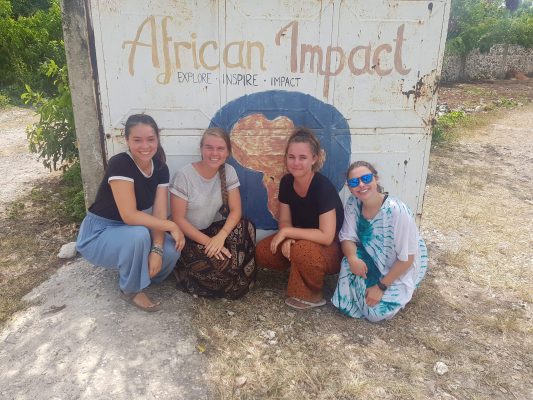By Rebekah Davis
At home, interactions with strangers are usually short and uninspiring. “How’s your day” “Good thanks, you?” However, here in Zanzibar, locals seek out English-speaking tourists and make small talk simply to improve their English skills. “I used to not be able to respond when someone asked how I am, I didn’t even know to say ‘fine, thank you.’ But I spoke to more people and slowly became better at English and I want to continue to get better” one local explained to me as I was taking my usual stroll down the beach.
I am currently co-oping at African Impact in a small village called Jambiani. The organization focuses on community development and only proceeds with a project if it something that the villagers expressly ask for. African Impact began with nursery school education in 2004, but quickly saw that there was a need for English lessons for adults. They began teaching English in schools after the students had left. Eventually, the organization decided they needed a home of their own. In 2011 they purchased the Land which would become the Jambiani Community Center. The Center now teaches over X students four days a week, all taught by volunteers. They have classes ranging from Literacy, which teaches students the alphabet, to High, where the students have discussions about emotional vs. intellectual intelligence and take classes to prepare their resumes.

Many of the students go on to get jobs at one of the many hotels on the island. One student, a member of the Maasai tribe named Martin, just became the manager of the Kupanga Villa on the beach.
“I never believed it would be like this” he said. Martin didn’t stop smiling as he recounted his story. “I came to Zanzibar for the first time five years ago and at that time I didn’t know any English at all, I didn’t even know the alphabet. I got a job as a security guard but that didn’t last very long. One of the other watchmen told me about a school called African Impact where you can learn English for free and I began to study there. It was difficult to get there because lunch was at 2pm and class was at 2pm and I couldn’t afford breakfast so I would eat really fast and run to class. I was trying to make money selling jewelry and cigarettes on the beach, but I couldn’t speak English and I couldn’t pay for food. I would tell myself that I have to keep going to school every day because it would help me later- I even used to sing the ABCs over and over again while I worked. Eventually, I had to go back home for three months. When I came back, I joined English class again but failed the first two exams. I told myself I needed to keep studying and on the third try I passed; I was so proud of myself. I went to the higher level and saw how English changes. I was really enjoying myself- I would write down words I didn’t know and repeat them over and over and I would speak to tourists more. It has taken me over four years, but I have finally gotten a good job. My older brother didn’t believe it when I told him, he was really laughing, and I told him I would send him my business card to prove it! Now, I built my own house, help other Maasai who cannot afford to eat and even pay for my younger brother’s school. I always tell people who are struggling that they have to go to African Impact, you really need it to succeed.”
The most touching part of teaching, in my experience, has been the writing exercises. One of the prompts last week was “Describe the last dream you had.” The students, misunderstanding, wrote about their hopes for the future. One student wrote about how his English skills could get him a job as a driver. Eventually, he aspires to buy his own private car. This lucrative career will not only provide for his family, he hopes, but for his own school that teaches English so he can help others the way African Impact helped him.
At home, I would normally turn my head down to the pavement when a passerby tries to speak to me. Here, I smile and respond “Jambo!” (Hello!”) to their greeting.
Find more information about volunteer, donation and internship opportunities here.


